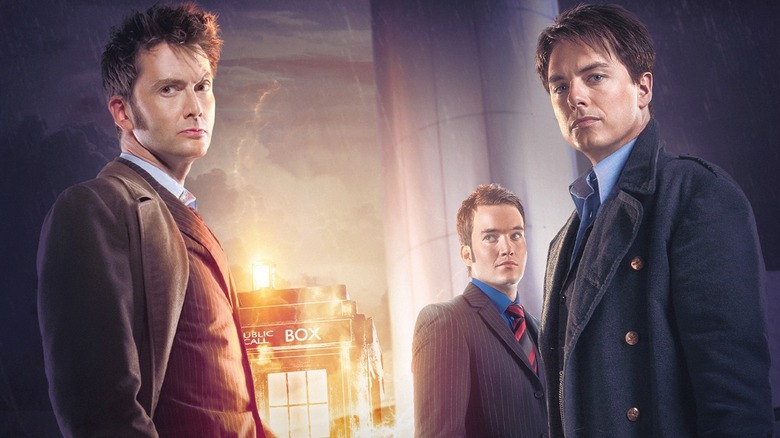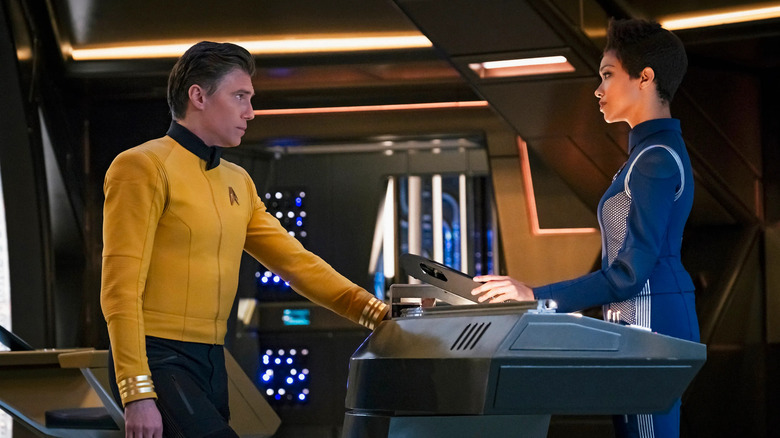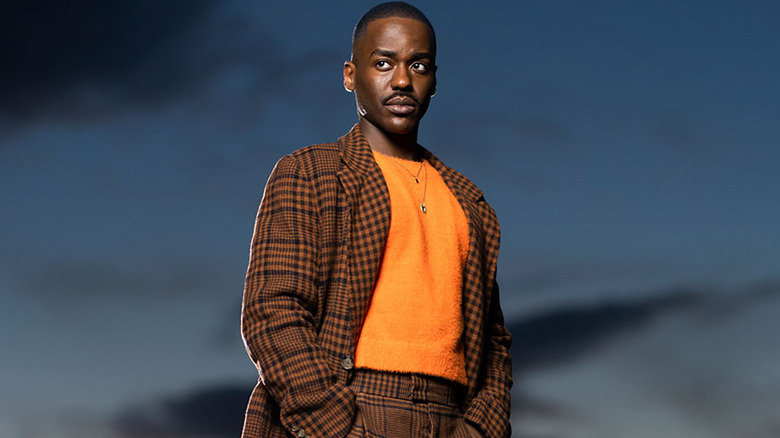Russell T Davies Is Planning Doctor Who Spin-Off Shows Inspired By The Star Trek Streaming Model
Even long-lapsed "Doctor Who" fans perked up their ears at the news that Russell T Davies, the showrunner who brought the series back with roaring success in 2005 and helmed it throughout the Christopher Eccleston and David Tennant eras, is returning for season 14. He'll be kicking things off with three 60th anniversary specials, featuring Tennant as (somewhat confusingly) the Fourteenth Doctor and Catherine Tate as former companion Donna Noble, before embarking on a new series of adventures with the Fifteenth Doctor, played by Ncuti Gatwa.
In a new interview with GQ magazine, Davies summarized his reasons for leaving "Doctor Who" in 2010 as "other things to write." Specifically, he wanted to focus on his comedy-drama series "Cucumber," which he'd been working on intermittently during his tenure as showrunner ("If 'Doctor Who' hadn't come along, I would've written that back in 2004"). After handing the reins over to Steven Moffatt, Davies moved to America, where he finished writing "Cucumber" and even received an offer from George Lucas to write "Star Wars: The Clone Wars." However, in 2011 Davies' husband, Andrew Smith, was diagnosed with a brain tumor and given only a three percent chance of recovery, so Davies took several years off work to care for him. Smith passed away in 2018.
"Cucumber" finally premiered in 2015, and Davies followed it up with a string of critically-acclaimed dramas: "A Very English Scandal," "Years and Years," and "It's a Sin." He tells GQ that "it wasn't a plan of mine" to return to "Doctor Who," but a combination of factors — including the success of "Star Trek," the BBC's distribution deal with Disney, and the bigger budgets that came with the deal — lured him back. And now it seems he has big plans beyond the main "Doctor Who" series.
To boldly go where Star Trek has gone before
With "Doctor Who" now set to be distributed via Disney+ in global markets, the sci-fi series that's known for its somewhat homemade-looking aliens is about to get a significant budget boost. Though Davies debunked rumors that the upcoming season could cost as much as $10 million per episode ("It's absolutely not. I wish it was, it'd make my life easier"), he also told GQ that the Disney funding will allow him to "tell stories on a bigger scale," and that without the show's former budget constraints "my imagination feels more free, a lot more free, actually."
Beyond new monsters and far-flung cosmic horizons, Davies also hopes to once again expand "Doctor Who" into spin-offs along the lines of "Torchwood" and "The Sarah Jane Adventures." He specifically cited the "Star Trek" franchise, which currently has five ongoing streaming series ("Discovery," "Picard," "Strange New Worlds," "Lower Decks," and "Prodigy"), as an inspiration:
"I watch the 'Star Trek' empire with vast envy: the way that's turned itself from an old archive show into something fantastic. The cast is so progressive, so good, so beautiful. And very cleverly I think 'Star Trek' is reaching out to making something like fifty-two episodes a year. So that's your yearly show, genius."
While "Doctor Who" season 14 won't get underway until 2024, it sounds like Davies already had some big plans in mind when he approached the BBC about returning. "I thought [...] it was time for the next stage for Doctor Who," the showrunner explained. "I thought the streaming platforms are ready, the spin-offs are ready; I always believed in spin-offs when I was there."
The Doctor Who TV universe
The Disney deal isn't the first time that the publicly-funded BBC has partnered with an American studio for a "Doctor Who" adventure. The 1996 TV movie starring Paul McGann was a co-production with the Fox Network and Universal Television, with Fox providing half of the $5 million budget. Despite hopes that it would become the jumping-off point for a full Fox-funded TV series, the US ratings weren't high enough to convince the network to sign up for more, and "Doctor Who" fell dormant until Davies' revival in 2005.
But almost three decades have passed since 1996 (brief pause here for millennials to recover from that statement) and the TV landscape looks very different now. The dominance of streaming means that geographic borders and even language barriers are less of an issue; shows like "Squid Game" and "La Casa de Papel" have found huge global audiences. Disney+ already has an established model of shared TV universes with its Marvel and Star Wars shows. It also helps that the incoming Doctor has proven appeal among both British and American audiences thanks to his role in Netflix's "Sex Education" (a show that itself exists in a bizarre cross-cultural soup of British accents and American football).
So yes, "Doctor Who" certainly has the potential to rise to new heights with Davies back on board and ambitious plans for a web of spin-offs. Still, while the showrunner might find his imagination set free by the expanded budget, some fans might miss the quaint charm of dodgy aliens designed on a shoestring budget.


